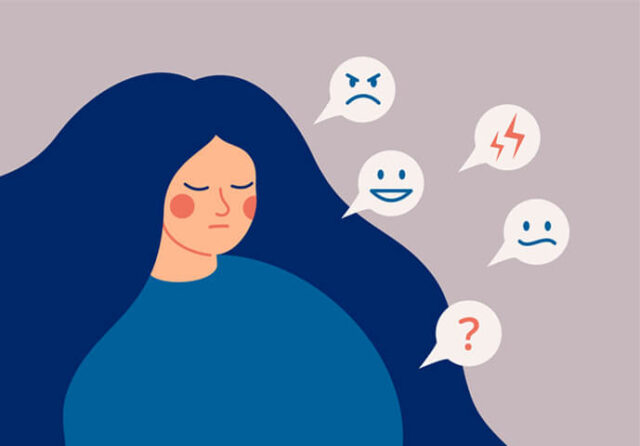Alexithymia, a term that means “no words for emotions,” affects around 10% of the global population. This condition makes it challenging for individuals to identify, describe, and manage their emotions.
Alexithymia is more prevalent among people with certain mental health disorders, including autism spectrum disorder (ASD), where rates can reach up to 66%. While not a clinical diagnosis, the impacts of alexithymia are profound, affecting personal relationships, professional lives, and mental well-being.
In India, growing awareness of mental health has led to an increased focus on alexithymia. Researchers have observed elevated rates of alexithymic traits among students in high-pressure fields, such as medicine and engineering.
With increased stress and rising rates of anxiety and depression, Indian mental health professionals are calling for more education and resources to address this widespread, often misunderstood condition.
What Is Alexithymia?
Alexithymia is defined by challenges in recognizing and articulating emotions, which can lead to a sense of disconnection from one’s emotional state and difficulty in understanding what they are feeling or why. The term was first coined in the 1970s and is a combination of Greek words: “a” (not), “lexis” (words), and “thymia” (soul or emotions), which together convey “no words for emotions”. Many people with alexithymia rely on external cues to infer emotions, instead of recognizing them directly.
Though often overlooked, alexithymia significantly affects how individuals process emotional information. This condition disrupts emotional awareness, making it difficult to respond to emotions in others and oneself.
Such a gap can lead to misunderstandings, particularly in relationships, where expressing emotions is key. According to global studies, about 10% of the general population may experience alexithymia, though this number can rise in people with specific mental health conditions.
The Role Of Interoception And “Alexisomia”
Interoception, or the ability to perceive internal bodily sensations, plays a central role in emotional awareness. Many people with alexithymia experience reduced interoceptive awareness, a condition also called “Alexisomia”. This can make it hard to distinguish basic bodily signals, like hunger or fatigue, and even more difficult to interpret complex emotional cues.
Research suggests that interoceptive deficits can lead to emotional numbness or confusion. When someone with alexithymia feels physical sensations tied to emotions, like a racing heartbeat, they might fail to connect it with stress or anxiety.
Dr. Samir Parikh, Director of Mental Health at Fortis Healthcare, has observed that this widespread inability to process emotions can lead to an increase in somatic complaints—physical symptoms without an identifiable medical cause, which are commonly seen in those with alexithymia.
For instance, in cases of extreme stress, people with alexithymia may not express typical signs of sadness or anxiety but may instead experience physical ailments like stomach issues, headaches, or chronic pain. Such somatic symptoms are prevalent among many Indians who may not have access to mental health services or may lack awareness about psychological issues, leading to a cycle of untreated physical and emotional distress.
This disconnect often leaves them struggling to manage emotional responses. In fields such as mental health and neuroscience, researchers are investigating ways to strengthen interoceptive skills to improve emotional processing in alexithymic individuals.
Prevalence And Vulnerable Groups
The prevalence of alexithymia is notably higher in people with certain conditions. Studies show that 33-66% of people with ASD experience alexithymia, making it a common characteristic in autistic individuals.
It also co-occurs with obsessive-compulsive disorder, post-traumatic stress disorder (PTSD), and depression. Trauma, such as childhood maltreatment or brain injury, can be a significant factor in developing alexithymia.
A recent study highlights that 15-20% of people with depression also display alexithymic traits, which complicates their treatment. Childhood trauma, particularly emotional neglect, is one of the most consistent predictors of alexithymia. For children in such environments, survival often involves detaching from emotions—a coping mechanism that can persist into adulthood, making emotional expression and awareness extremely difficult.
Alexithymia In Social And Cultural Contexts
Alexithymia may manifest differently across cultural backgrounds, especially in societies where emotional restraint is valued. In India, cultural norms often discourage the open expression of emotions, especially among men, leading to an increased prevalence of alexithymic traits. Social expectations like “suppressing feelings” or “manning up” reinforce emotional detachment, making it harder for individuals to develop emotional awareness.
According to psychologist Dr. Rajat Mitra, Alexithymia is under-recognized in India, yet it impacts mental health significantly. With mental health stigmatization still prevalent, Alexithymia remains unnoticed, often written off as emotional aloofness or lack of empathy.
However, this phenomenon is not limited to any one culture; studies show similar trends in collectivist societies worldwide, where collective harmony is often prioritized over personal emotional expression.
Impact On Relationships And Communication
Attachment theory suggests that the way caregivers interact with children in their formative years significantly impacts emotional development. Indian parents, traditionally seen as disciplinarians, may inadvertently contribute to alexithymic tendencies by discouraging open emotional expression.
The International Journal of Indian Psychology reports that the attachment styles developed in childhood often influence how emotions are handled in adulthood. This can manifest in adult Indians who are emotionally reserved, reluctant to display vulnerability, or unable to verbalize their feelings effectively.
People with alexithymia often struggle with interpersonal communication, as they may misinterpret social cues or struggle to express their needs. This can create challenges in romantic relationships, friendships, and even professional interactions. Alexithymic individuals may react in unexpected ways to emotionally charged events like celebrations or losses, leading to misunderstandings or even conflicts.
The emotional disconnect in alexithymia extends beyond self-awareness to reading others’ emotions. Individuals might seem emotionally distant, leading their partners to feel unsupported or confused by their reactions.
Also Read: Here’s How To Detect If You Are Going Through An Emotional Hangover
Identifying And Managing Alexithymia
Because alexithymia is not a formal diagnosis, identifying it can be challenging. Psychological tests, such as the Toronto Alexithymia Scale, can measure the degree of emotional awareness and expression difficulties. Building emotional awareness in alexithymic individuals involves practices like naming emotions, mindfulness, and engaging in expressive therapies like art or music therapy.
Experts recommend exercises that focus on identifying bodily sensations and associating them with emotions. This could include using a “feeling wheel” to find labels for sensations or practising self-reflective journaling. Although these strategies don’t eliminate alexithymia, they can help individuals develop better emotional resilience and communication skills, ultimately improving their quality of life.
Developing Emotional Awareness As A Skill
Emotional awareness is not fixed and can be improved with practice. Techniques like mindfulness and guided imagery help individuals with Alexithymia connect with their emotions. Research has shown that practising these techniques can enhance interoceptive awareness, leading to a more connected emotional experience over time.
In India, therapists are beginning to incorporate culturally adapted methods to address alexithymia holistically. Dr. Meena Gupta, a psychologist in Mumbai, notes, “Meditation and yoga offer mindful approaches that resonate with Indian culture, helping individuals develop a closer connection with their body and emotions.”
Such culturally relevant practices provide tools for managing alexithymia, especially in societies where emotional expression is less encouraged.
Alexithymia may be invisible, but its effects are deeply felt by those who experience it and those close to them. Recognizing and understanding this condition is a vital step toward supporting people with Alexithymia. For many, developing emotional awareness is possible, especially with supportive practices that help them connect with their internal experiences.
Addressing Alexithymia on an individual and societal level involves destigmatizing mental health and promoting emotional literacy. By fostering emotional awareness and equipping people with tools to express themselves, societies can help bridge the gap between emotional experience and communication, bringing people closer to understanding themselves and others.
Image Credits: Google Images
Sources: Times of India, Economic Times, Firstpost
Find the blogger: Katyayani Joshi
This post is tagged under: mental health India, emotional awareness, alexithymia awareness, psychological health India, emotional intelligence, mental health education, mental wellness India, mind health, health in India, emotional growth, youth mental health, emotional wellbeing, India healthcare, understanding emotions, health awareness, India mental wellness, mental health stigma, cultural impact on health, Indian mental health
Disclaimer: We do not hold any right, or copyright over any of the images used, these have been taken from Google. In case of credits or removal, the owner may kindly mail us.
Other Recommendations:
How Our Emotions Affect Our Health-Emotions And Diseases Are Linked!






































